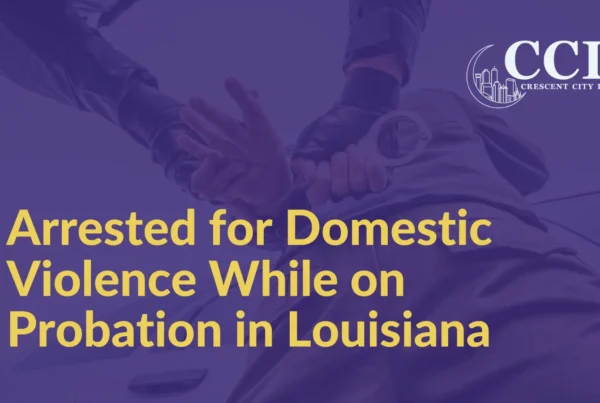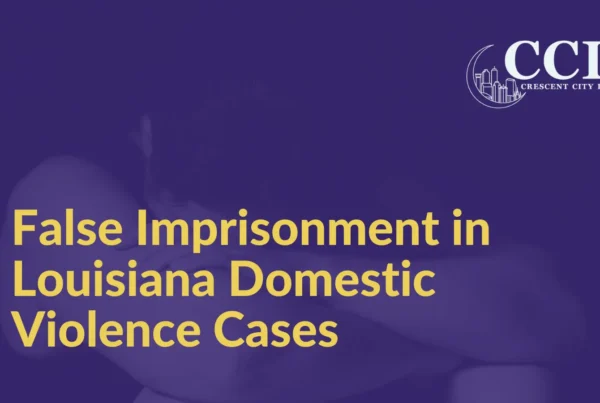If you are charged with domestic violence in Louisiana, you could be facing potential jail time and high fines.
In addition to that, specific domestic violence laws such as Gwen’s Law will most likely make it more difficult for you to bail out after you get arrested. It’s important to understand Gwen’s law, so that you have the knowledge you need to protect your rights.
The experienced team of Crescent City Law domestic violence lawyers is here to explain what Gwen’s Law could mean for your case.
What is Gwen’s Law?
According to Louisiana law under CCRP 313, Gwen’s Law makes it more difficult for people arrested for domestic violence to get out of jail on bail. It is designed to create a cooling period for people who are arrested for domestic violence and to create protections for victims of domestic offenses.
For those arrested for violation of a protective order, domestic abuse, battery, stalking, or another felony offense involving the use of a deadly weapon or force, there must be a hearing for the judge to grant or deny their bail.
This law went into effect in Louisiana in 2017, named after the tragic story of Gwen Salley. Salley was fatally shot by her estranged husband, who had already been arrested for holding Salley and her daughter at gunpoint. However, the husband was bonded out of prison, with the promise that he would respect a protection order Salley had put in place. He broke the protection order, found Salley, and shot and killed her and himself.
Thus, Gwen’s Law is one of several Louisiana domestic violence laws that are put into place to protect victims of domestic violence.
Domestic Violence Bail Process in Louisiana
Since the passing of Gwen’s Law in Louisiana, there are additional factors that judges must take into account when granting or denying bail for people arrested on domestic violence charges.
Criminal record
In many cases, domestic violence offenders are arrested multiple times for the same offense.
If someone has multiple domestic violence charges on their criminal record or charges for other violent felony crimes, the judge will take this into account when deciding whether or not to grant bail.
Level of threat
Judges will also look into the circumstances to determine whether the offender poses an immediate threat to the victim, the victim’s family, and the victim’s community. If they determine that there is a high level of threat, it is more likely that the judge will deny bail.
Personal history
To determine if someone arrested for domestic violence in Louisiana will be posted a bail bond, judges will also look into their documented personal history.
This includes records of:
- Substance abuse
- Suicide threats
- Threats of violence
- Sexual abuse
- Death threats
The Results of a Gwen’s Law Hearing in Louisiana
After the judge goes over the factors listed above, there are two possible rulings:
- Bail is denied: if the judge considers the accused to be too dangerous to be allowed to leave prison, based on clear evidence, they will deny bail. This is also the case if they determine that the accused is at a high risk of not appearing at their scheduled court date.
- Bail is granted: if the judge decides that the accused is not an immediate threat to the victim or the victim’s community, they will grant bail. In some cases, the accused may leave prison, but they may be under house arrest or otherwise have their position monitored.
Penalties and Sentences for Domestic Violence Charges
Regardless of whether you are granted or denied bail, there is a range of serious penalties you will face if you are charged with domestic violence in Louisiana.
The penalties for domestic violence in Louisiana will depend on the severity of your offense, whether you have prior convictions and the extent of the injuries.
Some common domestic violence offenses and their potential penalties include:
- Domestic Abuse Battery: Physical harm or contact against a family or household member. The penalties include fines and up to six months in jail. However, the penalties are more severe if the two parties live together, have children together, or are biologically related.
- Aggravated Assault: Physical harm or contact with the use of a weapon and/or that results in serious bodily injury. The penalties for this can include significant fines and up to ten years in prison.
- Violation of a Protective Order: If a court has issued a protective order against you and you violate its terms, you may face fines and imprisonment for up to six months for the first offense and up to two years for subsequent offenses.
For some offenses, the police can add ‘domestic’ as an element of the offense in the police report, and this will trigger Gwen’s Law protections.
Additionally, Louisiana law doesn’t allow for expungement of domestic violence convictions. That’s why it’s so important to work with an experienced criminal defense attorney from the get-go to reduce or dismiss your charges.
Contact John at Crescent City Law
If you or someone you know is facing domestic violence charges in Louisiana, please contact Crescent City Law to schedule a consultation. With the right defense, we are often able to defend your right to bail in the Gwen’s Law hearing or have charges dismissed or reduced. Let us help you build your defense today.






